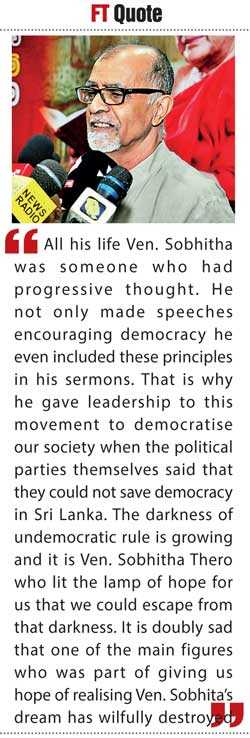Thursday Feb 26, 2026
Thursday Feb 26, 2026
Friday, 9 November 2018 00:00 - - {{hitsCtrl.values.hits}}
Giving an eerie warning on the repercussions of the ongoing political crisis in the country, veteran political scientist Prof. Jayadeva Uyangoda called on all community leaders to take a leadership role in solving the crisis before it descended into violence and bloodshed.
Prof. Jayadeva Uyangoda, a political scientist and constitutional expert, delivering the keynote address at the  commemoration of the third death anniversary of Maduluwawe Sobhitha Thero, said the current crisis was a multifaceted one with economic, political, constitutional, institutional and moral implications.
commemoration of the third death anniversary of Maduluwawe Sobhitha Thero, said the current crisis was a multifaceted one with economic, political, constitutional, institutional and moral implications.
Dissecting the events that preceded events on 26 October, Prof. Uyangoda said that the conflict that developed among the three main political forces in the country over the last few years had now escalated into a full-blown power struggle.
“It has become a battle to take over state power. The battle that was earlier among three parties has now become a confrontation between two parties. The citizens who are supposed to be the sovereignty of democracy have been reduced to powerless observers of this struggle. The house of representatives of the people, the Parliament, has been closed, it has been taken over by the Executive,” he said.
Paying homage to the visionary leadership of Sobitha Thero, who spoke of abolishing the Executive Presidency and has been a lone voice for democracy at a time when no other leader dared to speak out, the professor said that it was time to revive the Buddhist leader’s thinking.
“All his life Ven. Sobhitha was someone who had progressive thought. He not only made speeches encouraging democracy, he even included these principles in his sermons. That is why he gave leadership to this movement to democratise our society when the political parties themselves said that they could not save democracy in Sri Lanka. The darkness of undemocratic rule is growing and it is Ven. Sobhitha Thero who lit the lamp of hope for us that we could escape from that darkness. It is doubly sad that one of the main figures who was part of giving us hope of realising Ven Sobhitha’s dream has wilfully destroyed it,” he said.
“It is now time to revive the thinking of Sobitha Thero to abolish the Executive Presidency.”
Outlining four major areas of concern in the current situation, Prof. Uyangoda said that those politicians who were elected on a reform agenda went only halfway to implement those reforms and now there was a danger that those reforms would be rolled back. Secondly, he outlined the link between democracy and corruption. There were shameless attempts to corrupt politicians to switch sides which were being carried out quite openly, he said.
Thirdly, these acts were being carried out with the knowledge of the highest power in the land and fourthly the Constitution had been violated by those who have sworn to uphold it wilfully and with criminal intent.
By not adhering to the Constitution, the leaders of this country have taken a grave risk and destabilised the country, leading to a breakdown of law and order, paving the way to bloodshed. Noting that even students of political science were taught that the Constitution, which is the supreme law of the land, must always be upheld, the professor lamented that the ongoing violation was being carried out by the most powerful person in the land.
“The educated young people of this country are looking at this and are increasingly convinced that our politicians are unprincipled, greedy and liars. Their political trust in the leadership is being broken. On social media these youths are expressing themselves and showing what they think of their leaders by making fun of them,” he said, painting a bleak outlook for the future.
“In the next few days the current power struggle between the two political camps will turn out to be an open power struggle between the Executive Presidency and Parliament. As I see it in the next two to three days there will be a direct confrontation between the Executive and the Legislature,” he warned.
Prof. Uyangoda noted that it has become increasingly clear that those who have created the crisis were struggling to settle it.
“They are now trying to find solutions to the crisis that began with violating the Constitution once by violating the same further. Right now they are discussing how they can further violate the Constitution.”
Warning that the capacity for this crisis to be solved peacefully and intellectually is fast closing, the professor said that the situation needed not just political intervention but moral intervention as well.
“A moral community made up of religious leaders, community leaders, intellectual leaders, the elderly and respected citizenry and civil society activists should intervene today to prevent this political crisis leading to bloodshed and violence,” the professor said, calling on community and civil society leaders to take an active role in intervening to solve the current political crisis.